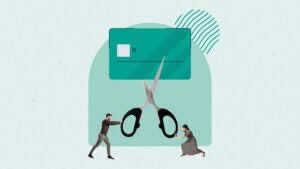Survey: Americans’ biggest coronavirus financial regret is not having enough emergency savings

The survey shows that of Americans with financial regrets, the biggest regret is a lack of emergency savings, which was noted by 23 percent of respondents. But when it comes to their biggest financial priority going forward, Americans are focused on paying down debt (22 percent), followed by saving more for emergencies (17 percent).
“At first blush, the regret about lack of emergency savings and the prioritization of debt repayment may seem at odds with each other — but not so,” says Greg McBride, CFA, Bankrate chief financial analyst. “Consumers can actually make meaningful progress on both fronts at the same time by setting up a direct deposit from their paycheck into a dedicated savings account and earmarking more discretionary dollars toward debt repayment.”
Bankrate surveyed 1,343 American adults about their financial regrets as they relate to the coronavirus. Below are the main findings from the survey.
Key takeaways:
- Americans’ biggest financial regret about the coronavirus pandemic is lacking emergency savings, with 23 percent citing this reason.
- Americans’ top financial priority for the future is paying down debt, with 22 percent naming this goal.
- Not enough emergency savings was the top regret for every income group, but not every age group.
The biggest financial regrets since the pandemic
Americans said that their largest financial regret about the coronavirus pandemic was not having enough emergency savings, with 23 percent of Americans targeting this regret. Other top responses included not having enough retirement savings (20 percent) and having too much debt (17 percent). About 20 percent of respondents said they didn’t know their top regret.
As a May Bankrate surveyed showed, more than one in four Americans have taken or anticipate taking money from their retirement accounts to make it through the coronavirus crisis.
The top financial priorities going forward
While Americans cited not enough emergency savings as their top regret, their top financial priority once the U.S. starts to recover from financial hardship doesn’t exactly match up. Instead, Americans are more focused on paying down debt, with 22 percent of respondents mentioning this goal.
Many Americans seem unprepared, and about 17 percent said they didn’t know what their top priority was. A similar number said they intended to save more for emergencies.
Among respondents who cited a financial priority, paying down debt was the top priority among millennials (20 percent), Generation X (24 percent) and boomers (25 percent). Generation Z cited finding more stable income (22 percent) as their top priority, while the Silent Generation said “some other financial priority” was the biggest deal for them (21 percent).
Broken out by income group, paying down debt was cited most often as the financial priority among those who expressed a priority:
- 27 percent among households earning $30,000 to $49,999
- 28 percent for households earning $50,000 to $79,999
- 21 percent among households earning $80,000 and more
Among households earning less than $30,000, the top priority was saving more for emergencies at 21 percent, though a further 22 percent said they didn’t know what their priority was.
How much Americans regret their financial choices
Bankrate’s survey also asked Americans to rate their level of regret about their financial status (emergency savings, retirement savings, debt, income stability and living beyond their means) since the coronavirus started.
Americans evoked similar levels of regretfulness about saving for emergencies and for retirement:
- Emergency savings: 16 percent of Americans were very regretful and 22 percent somewhat regretful.
- Retirement savings: 16 percent were very regretful and 23 percent somewhat regretful.
The regretfulness associated with the remaining three categories was notably less:
- Amount of debt: Very regretful (13 percent) and somewhat regretful (18 percent)
- Income stability: Very regretful (11 percent) and somewhat regretful (18 percent)
- Living beyond your means: Very regretful (9 percent) and somewhat regretful (18 percent)
Of those who expressed regret, not enough emergency savings was the top regret for every income group (below $30,000, $30,000 to $49,999, $50,000 to $79,999 and more than $80,000).
By age group, not enough emergency savings was the top financial regret for millennials (24 percent) and Generation X (25 percent). In contrast, not enough retirement savings was the top regret for boomers and the Silent Generation who expressed a regret.
Lower income was associated with a higher tendency to list income stability as the top financial regret, with households earning less than $30,000 per year being the highest at 18.6 percent.
The list is rounded out by:
- 12.6 percent of households earning $30,000 to $49,999
- 11.6 percent of households earning $50,000 to $79,999
- 11.3 percent of households earning more than $80,000
How Americans can protect themselves
Whether it’s emergency savings or retirement savings, Americans regret not saving more, with about 43 percent of respondents noting one or the other. The results from this survey echo those from a recent Bankrate survey showing that Americans are behind in their retirement savings.
One of the best steps to take is to automate savings, whether it’s retirement or emergency savings. By doing so, workers can avoid the temptation to not save.
For retirement savings such as a 401(k), it’s easy to have the money pulled directly from your paycheck and invested. If you’re already saving there, you can also easily increase how much is pulled from your pay. But you can also set up your IRA to deposit money from your bank account automatically.
For emergency savings, you can set up the same kind of automatic transfer. Have your bank transfer money from your account on a regular basis, for example, whenever your paycheck hits the account.
Second, you’ll also want to take advantage of a high-yield savings account. While it can be convenient to keep your money with one bank, that approach may be costing you. And with the ease of moving money from one bank to another, it’s simple to have an online bank account that offers you a higher level of interest, but you’ll need to shop around for the best high-yield savings rates.
Methodology
This study was conducted for Bankrate via online interview by YouGov. Interviews were conducted from June 3 – June 4, 2020 among a sample of 1,343 adults. Data are weighted and are intended to be representative of all U.S. adults, and therefore are subject to statistical errors typically associated with sample-based information.
Featured image by Getty Images; Illustration by Bankrate.
Why we ask for feedback Your feedback helps us improve our content and services. It takes less than a minute to complete.
Your responses are anonymous and will only be used for improving our website.





